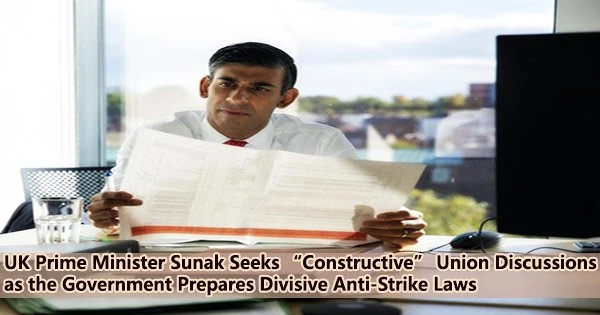While his administration is drafting contentious anti-strike legislation, U.K. Prime Minister Rishi Sunak is prepared to visit union leaders this week for what he thinks would be “constructive” negotiations in an effort to stop widespread industrial action.
In recent months, tens of thousands of workers across industries have protested for better working conditions and salary increases that keep pace with the UK’s continuing double-digit inflation rate.
U.K. inflation slowed to 10.7% annually in November from a 41-year high of 11.1% in October, and the country’s independent Office for Budget Responsibility projects that British households are set to experience their sharpest fall in living standards on record.
Sunak told reporters during a visit to a London school on Friday that he is seeking a “grown up, honest conversation with union leaders about what is responsible, what is reasonable and what is affordable for our country when it comes to pay,” according to Reuters.
His comments came just a day after his government announced new anti-strike laws in a bid to “enforce minimum service levels” across key public services, including the National Health Service, schools, rail networks, nuclear commissioning and the fire service.
The legislation would enable employers to fire workers who took part in strike action and sue unions for causing disruption; Sunak’s government aims to submit it in Parliament in the coming weeks.
The full details of the plan may be laid out as soon as union leaders met Thursday, according to The Times newspaper, but the initial announcement with outrage.
The Royal College of Nursing (RCN), which has been undertaking the first strike action in its 106-year history in recent weeks, called the move “undemocratic,” while the general secretary of the Fire Brigades Union (FBU) said the entire trade union movement would “fight this pernicious attack on workers by all means available.”
Over the weekend, Sunak softened his tone further on the nurses’ strikes, telling the BBC that he is open to talks over a new pay deal that is “responsible” and “affordable,” with further walkouts in NHS workplaces across England slated for Jan. 18 and 19.
On the same BBC show, RCN General Secretary Pat Cullen called Sunak’s shift a “chink of optimism” and urged the prime minister to meet her “halfway.”
Talks between the government and union leaders are scheduled for Monday, but Unite, one of the country’s largest unions which also represents NHS members including ambulance workers, accused Sunak of “misleading the British public” over pay negotiations.
Unite General Secretary Sharon Graham, in a statement Sunday, reiterated that no progress on the upcoming (2023/4) NHS pay review could be made while the current 2022 NHS pay claim remains unresolved.
“I have repeatedly called for the prime minister to come to the table on this. All the general secretaries representing NHS workers stand ready to negotiate with him at any time,” Graham said.
“But this meeting on Monday has been misrepresented on almost every level. It is not a negotiation, it is not on current NHS pay and it is not with the prime minister.”
Graham added that unless Sunak “accepts the need to make real progress on the current pay claim, there will still be strikes across the NHS this winter.”
A total of 2,600 Unite ambulance workers are set to strike on Jan. 23 with further action in Wales on Jan. 19.
With hospitals overflowing, patients laying in hallways, and ambulances backed up outside emergency departments unable to discharge patients or answer new calls, the NHS is in an unparalleled state of emergency. Health trusts and ambulance services around the country have declared “critical incidents” in recent weeks as services are overrun.
Sunak held an emergency meeting with health leaders over the weekend and told them that “bold and radical” action would be needed to guide the NHS through the crisis.
National rail networks have also been heavily disrupted by strikes over the past four weeks, with the latest 48-hour walkout by members of the Rail, Maritime and Transport Workers union resulting in only around one in five trains across Great Britain running on Saturday.
















